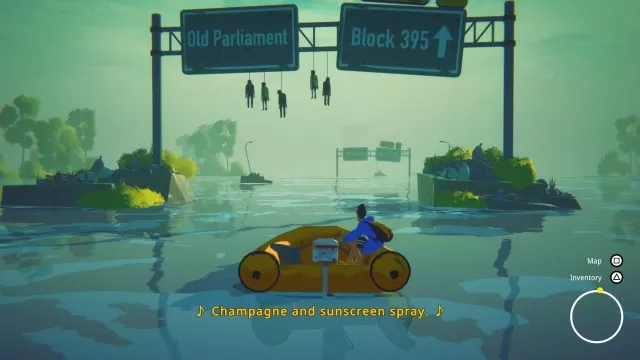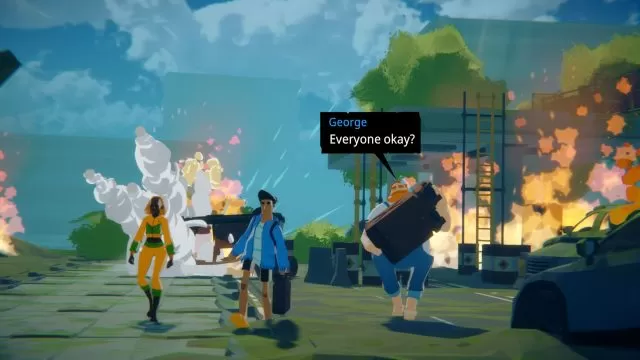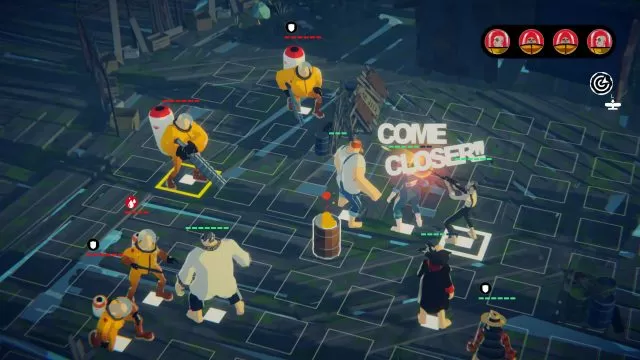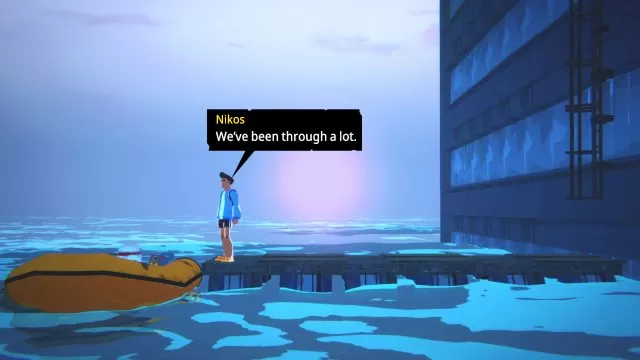Highwater Review – When the Levee Breaks
The world didn’t end with a bang but with a splash. Gradually, then suddenly, the waters rose and drowned the civilization. The privileged weathered the storm in walled enclaves, while the destitute were left to fend (mostly) for themselves, Elysium style. Soon, it became clear that the ruined ecosystem was deteriorating even further, prompting the rich to contemplate a one-way trip to Mars. Rather than search for solace by re-reading the Left Behind novels, one intrepid group of proles decided to hitch a ride on the big rocket, boarding passes be damned.
Highwater is a post-apocalyptic tactical narrative adventure with a laid-back attitude and a distinct south-eastern European vibe. Young Nikos and his rag-tag group of friends and acquaintances live on the surface of the massive body of water that drowned the Balkans. The gang barely scrapes by, sandwiched by the hi-tech Alphaville army and the local insurgency. The food is gone, the water is foul, and the neighbors are restless. The only way out there is Mars via Alphaville, but the sailing to verboten Rocket City will be anything but smooth.
A trek through flooded Balkans

You’ll split your time in Highwater between water and patches of land, roughly in equal measure. Steering Argo, your trusty rubber dinghy between the remnants of the old world, you will constantly be reminded of the fragility of nature and the superiority of reinforced concrete. Those familiar with the southern Balkans will recognize the shapes of famous architecture from Yugoslavian regions and cities. Passing by famous “spomeniks” and remnants of the brutalist constructions from contemporary Belgrade is a morbidly melancholic affair.
On land, expect dialogue, light exploration, and tactical combat. Conversations, even if there’s no voice acting apart from the radio program, are oozing with humanity. The people in your survivor community are a tough bunch with typical Southern temperament and resourcefulness. The villains are never diabolical and are mostly driven by circumstances. Highwater establishes early the sad fact that saving everyone is impossible and that the majority will have to stay put and hope for the best. Even the happy ending you are aiming for is not going to work for everyone.
Straightforward and high on puns

The “narrative adventure” part of Highwater is mostly linear, with tiny, NPC-related branching that doesn’t affect the outcome. Early on, the game will introduce you to everyone via the magic of fetch quests. You’ll gradually become familiar with the classic dystopian divide between a chosen few and unwashed multitudes, but to the developer’s credit, the game never resorts to preaching. Instead of going on the nose with radical progressivism, Highwater utilizes satire. Apart from the dialogue, you’ll find the best examples of that approach in books, newspapers, and similar bits of scattered lore that’s sitting around, waiting to be discovered. From the slightly cringey Muskovic VS Bozo rocket rivalry to casually ridiculing Francis Fukuyama’s “end of history” trope, some of these snippets are spot-on.
Besides sailing from one story node to another, it pays off to explore in search of lore and extra bits of gear. The „tactical“ segment of Highwater benefits from equipment assigned to the members of the group, some of which have game-changing potency. There’s a lot of fighting in this game, but the feather-light challenge never gets in the way of storytelling. In Highwater, violence serves as the fortifying element of the narrative, not as an obstacle demanding sweaty trial and error. It’s here to point out that real-world self-preservation is never an innocent affair.
Slippery When Wet

The actual combat is a turn-based affair that happens on a rectangular grid. The concept is very straightforward, consisting of moving and attacking or using abilities, and occasionally exploiting the terrain. Gear such as a harpoon or fishing rod is perfect for said exploitation, as you can rapidly dispatch the foes by dragging them into water or off the ledges. Few characters have unique abilities, some more useful than others. Nikos, for example, can flash his camera and deprive the foe of the next turn. It’s neat, but it pales in comparison to Josephine’s chain-killing Bloodlust. That one is grossly imbalanced, but since the combat is a narrative crutch, it doesn’t diminish the experience.
The variety of enemy types is not abundant. You’ll fight people most of the time, aided by some robots in the Alphaville section. Some are melee-focused, others carry firearms, but there aren’t any grenades or complex weapon systems. There’s a single boss near the end, and he too is a pushover, easily stunlocked for most of the fight. The damage and casualties suffered in combat are temporary as everything resets for the next one. Leveling and XP accumulation is also non-existent.
The Flame in the Flood

Overly basic combat is not my only gripe with Highwater. While the aesthetics are very distinctive, the animation style is simple and, sometimes, sloppy. The game would benefit from tighter QA and a few more passes over visuals, but Damocles’s sword of budget constraints is hovering over everyone’s head nowadays. Fortunately, this inconsistency doesn’t diminish the experience.
It will take around five to six hours to beat the main story, after which you can engage with two short epilogue snippets that tie everything up. Balkan people hate cliffhangers with a passion, and that naturally applies to Balkan devs. The Highwater narrative connects with the previous games from the Demagog studio, so you can check them if you like the vibe here.
Highs
- Interesting story full of pathos, melancholy, and nostalgia.
- Cast of quirky, likable characters and plenty of clever pop-culture references.
Lows
- Distinctive visuals marred by over-simplistic animation style.
- Unbalanced combat with few vastly overpowered weapons and concepts.

